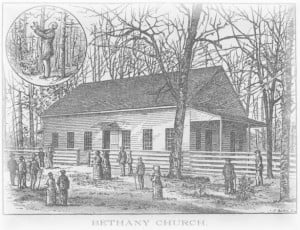5 Years in Southern Mississippi Bethany Church by Dr. Whitsitt
 Bethany Church is situated in the densely populated section on the eastern border of Lawrence County, nearly forty miles from a railroad, east or west, and fourteen miles from Pearl River.
Bethany Church is situated in the densely populated section on the eastern border of Lawrence County, nearly forty miles from a railroad, east or west, and fourteen miles from Pearl River.
The church house stands in a beautiful grove of gum trees on the Western bank of Whitesand Creek, which a few miles below unites with Little Whitesand and flows on to the river. The membership at the time of my entrance on the pastorate extended from Buoy on the east to near Silver Creek on the west, a distance of more than fifteen miles; and nearly the same distance up and down Whitesand. The people were thickly settled, on the latter creek especially, approaching the likeness of a continuous village. I have often remarked that it was the -most populous country community of my knowledge in south Mississippi. The people were not wealthy, but there were many independent farmers. The soil is fertile and well cultivated; cotton, corn, oats, rice, cane, potatoes, garden vegetables and fruits were grown. It is a common opinion among farmers that too much attention is given to the cultivation of cotton to the neglect of products for home consumption. This is perhaps the reason why at some seasons of the year the country seems almost impoverished. The country is dotted over here and there with retail stores, which do a credit business. This business however has not been very successful, owing to the large sales easily made, which are followed by insufficient collections. Much injury has been sustained in consequence of the agricultural lien law of the State, which gave to farmers opportunity to mortgage not only their land and stock, but also the growing crop. By that means was held out, an inducement to run extravagantly into debt, in the hope of what might be produced. It also furnished an inducement to try to shun payment of debts thus contracted and occasioned in the long run much trouble and distress.
The school interest was largely neglected, not to say, in many places, ignored. The public school was the chief dependence, and this owing partly to the shortness of the term, and partly to the looseness, with which the funds were applied, failed to accomplish the best results. Many children were growing up all over the country with the merest smattering of a common-school education. This was to be charged somewhat to the insufficiency of the public schools as mentioned above, somewhat to the unprosperous condition of the country, but more largely to the want of public spirit and to the indifference of parents in respect to the education of their children? There were very few schools of any permanence save in some of the towns.
As respects religious belief, the country was largely Baptistic. There were a few scattering Catholics, the result of an effort in the last few years made by the Catholics on the coast to extend their influence northward; but this movement soon came to naught. There were some Methodist families in the community, and they seemed to be increasing rather than diminishing in influence. The congregation at Bethany was first an arm of Silver Creek church some seven miles southwest. It was constituted a church in 1819 under the labors of Eld. John P. Martin, the father of Eld. M. T. Martin now of Texas. He was one of the pioneer preachers of this section. I have heard the citizens speak of the time when he walked from his home as I remember, on Holiday’s Creek some ten miles off and preached to the rustic settlers under the shades of Whitesand’s trees. Soon after its recognition as a church, it became the charge of Eld. Norvel Robertson, Jr., under whose care it continued until his death, a period of more than forty years. In the five or six years that followed his death, the church had been served by about as many pastors, some of them among the finest in the State.
The membership now numbered about two hundred and fifty. For a few years the number had been declining. Of the membership one division was fully abreast with the times, ready for any advanced movement beyond the old lines of church work. Another part were more conservative, slow to give up the old methods, or to sanction any new movement, but good brethren, rooted and grounded in the faith. A third part consisted of those who are found, alas! in all churches, who seem to be there merely as a matter of course, just for the name of being church members, with no better aim, apparently than to escape the sinner’s hell and attain to the Christian’s heaven. Such was the country and community, which was to be the greatest concern to me, and to claim the largest share of my affection, for the next few years.
